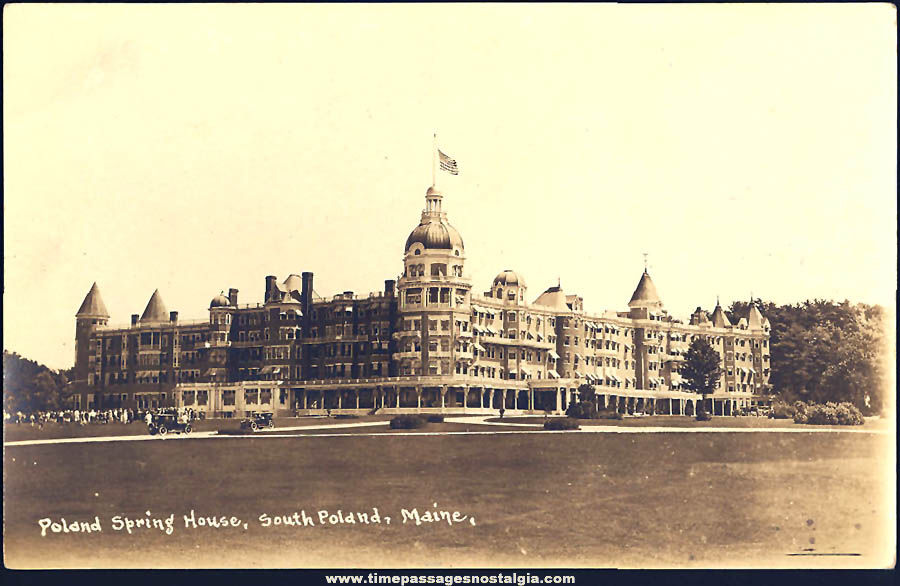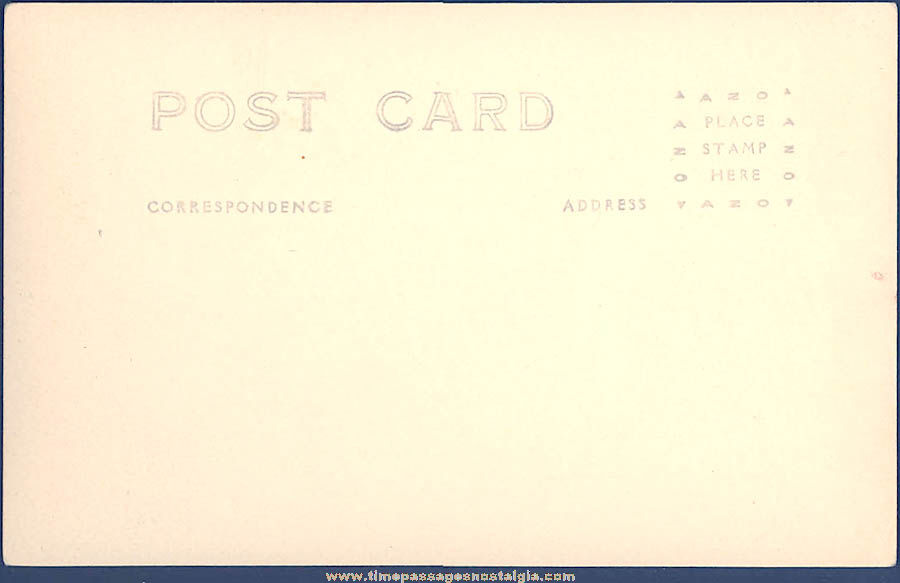
 | Item #l365 | 
Price: $14.99
$6 shipping & handling
For Sale
|
|
  | | | Any group of items being offered as a lot must be sold as a lot. | | | Fast Dependable Service | | We have an extensive inventory that is not yet on our web site. If there is something you are looking for and did not find, please send us your wish list. | | Unique & Fun Nostalgic Items | Whether you've collected Memorabilia for years or just want to feel like a kid again, please take a few moments to browse through what we
have available for sale. | | Quality Merchandise At Reasonable Prices | Quality Packing And
Postal Insurance | It's never too late to
have a happy childhood! | Nostalgic Memorabilia, Pop Culture Artifacts, Historic Items,
and "Shoe Box Toys" |
| | | | The pictures below show larger front and back views of this Old Unused Poland Springs House Maine Real Photo Post Card. This post card is not dated but it is believed to be from the 1920s. At the left side many people can be seen as well as some 1920s automobiles. An American flag is flying on the ornate dome. It is marked as follows: POLAND SPRING HOUSE, SOUTH POLAND, MAINE. The postcard measures 5-3/8'' x 3-7/16''. It appears to be in mint unused condition as pictured. Below here, for reference, is some additional information about the Poland Springs House Resort: Poland, Maine
From Wikipedia, the free encyclopedia The Poland Spring House (1876-1975) Poland is a town in Androscoggin County, Maine, United States. The population was 5,376 at the 2010 census. Home to Range Ponds State Park, Poland is a historic resort area. It is included in both the Lewiston-Auburn, Maine metropolitan statistical area and the Lewiston-Auburn, Maine metropolitan New England city and town area. History
Land was granted by the Massachusetts General Court in 1765 to officers and soldiers who served with Sir William Phipps in the 1690 Battle of Quebec. It replaced a 1736 grant made to them called Bakerstown (now Salisbury, New Hampshire) which was ruled invalid in 1741 at the separation of New Hampshire from Massachusetts. The new plantation was also called Bakerstown (after Captain Thomas Baker), and included present day Poland, Minot, Mechanic Falls and the greater part of Auburn. Settled in 1767 by Nathaniel Bailey and Daniel Lane, Bakerstown Plantation would be incorporated as Poland on February 17, 1795.
At the beginning, Poland was an agricultural town, with 600 acres (2.4 km2) of the best land farmed by the Shakers who settled at Poland Hill, north of the Sabbathday Lake Shaker Village in New Gloucester. Called the North Family of Shakers, the village was founded by members who moved from Gorham in 1819. The village lasted until 1887.Industry was attracted to Poland's water power sites. In 1859, when the population was 2,660, it had 4 sawmills, a gristmill, a tannery and a carriage factory. The St. Lawrence and Atlantic Railroad passed through the northeastern corner of the town, spurring development and bringing tourists drawn to its scenic ponds and gentle hills. By 1893, when Mechanic Falls was set off as a separate town, Poland had evolved into a Gilded Age resort town. In 1797, The Wentworth Ricker Inn in South Poland opened at the homestead Jabez Ricker, acquired from a 1794 land swap with the Alfred Shaker Village in Alfred. But when the railroad replaced stage travel, patronage declined and the inn closed. Then a grandson, Hiram Ricker, began proclaiming that the mineral spring on his family's property had cured his dyspepsia. People began arriving to sample the spring's curative waters, which flow 8 gallons a minute. Reopened in 1861, the inn was enlarged and renamed The Mansion House. But even that property could not handle the crowds of tourists, so in 1875 the family expanded the property, build an extravagant house that was dubbed 'Ricker's Folly', due to skepticism that such a large property would be successful. On July 4, 1876, The Poland Spring House opened atop Ricker's Hill, an elevation of 800 feet above sea level with magnificent views to the White Mountains in New Hampshire. The hotel would be augmented over the years by architects John Calvin Stevens, Albert Winslow Cobb and Harry Wilkerson. It became a self-contained and exclusive spa, with guards at gatehouses instructed to turn away sightseers. With luxurious accommodations for 450 guests, the hotel attracted the rich and famous. Patrons included Gen. Benjamin Butler, Sen. James G. Blaine, Joan Crawford, Jimmy Durante, Jack Paar and Robert Goulet. But following World War II, the era of grand hotels waned. When the Rickers sold The Poland Spring House, its new owners allowed the sprawling facilities to deteriorate. On July 3, 1975, the vacant hotel burned. |
|
Click on image to zoom.
  |